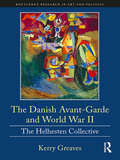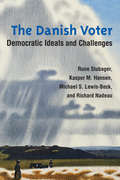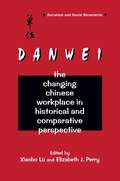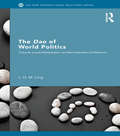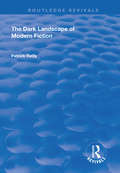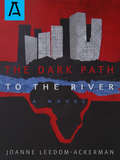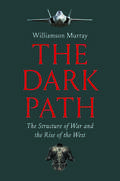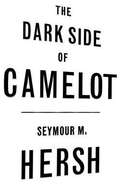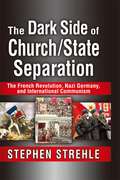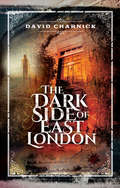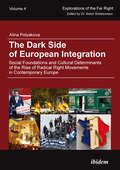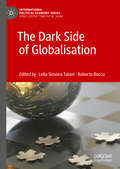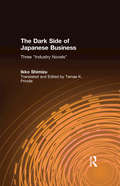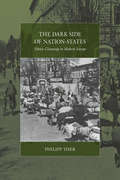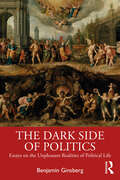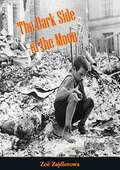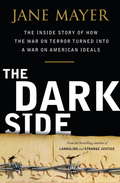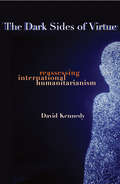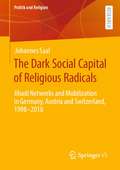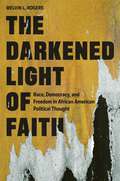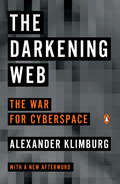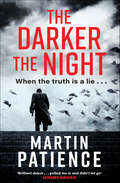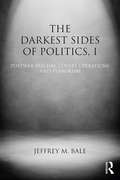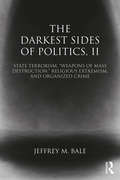- Table View
- List View
The Danish Avant-Garde and World War II: The Helhesten Collective (Routledge Research in Art and Politics)
by Kerry GreavesThis is the first book to focus on Helhesten (The Hell-Horse), an avant-garde artists’ collective active during the Nazi occupation of Denmark and one of the few tangible connections between radical European art groups from the 1920s to the 1960s. The Danes’ deliberately unskilled painterly abstraction, embrace of the tradition of dansk folkelighed (the popular) and its iterations of egalitarianism and consensus reform, called for the political relevance of art and interrogated the ideologies underlying culture itself. The group’s cultural activism presents an alternative trajectory of continuity, which challenges the customary view of World War II as a moment of artistic rupture.
The Danish Voter: Democratic Ideals and Challenges
by Rune Stubager Richard Nadeau Michael S. Lewis-Beck Kasper HansenFor many international experts, politicians, and commentators, Denmark stands out as an ideal society with a well-functioning welfare state, low levels of corruption, and a high degree of social and political stability. Like other countries, however, Denmark faces challenges brought on by overall societal changes—particularly the challenges of maintaining a prosperous economy and from the growing number of immigrants with different ethnic and religious backgrounds that have left their mark on Danish society over the past 50 years. But how have Danish voters reacted to these challenges? The authors of The Danish Voter investigate a series of interesting questions concerning voters’ reactions to these macrosocial challenges and how their reactions affect the foundations for the ideal. Indeed, due to an electoral system open to new influences, the Danish case is an important test case for theories about political development of contemporary Western societies.
The Danwei: Changing Chinese Workplace in Historical and Comparative Perspective
by XiaoboThe danwei, or work unit, occupies a central place in Chinese society. To understand Chinese politics demands a better understanding of this system. This volume provides a systematic study of the danwei system and addresses a variety of questions from historical and comparative perspectives.
The Dao of World Politics: Towards a Post-Westphalian, Worldist International Relations (New International Relations)
by L. LingThis book draws on Daoist yin/yang dialectics to move world politics from the current stasis of hegemony, hierarchy, and violence to a more balanced engagement with parity, fluidity, and ethics. The author theorizes that we may develop a richer, more representative approach towards sustainable and democratic governance by offering a non-Western alternative to hegemonic debates in IR. The book presents the story of world politics by integrating folk tales and popular culture with policy analysis. It does not exclude current models of liberal internationalism but rather brackets them for another day, another purpose. The deconstruction of IR as a singular unifying school of thought through the lens of a non-Westphalian analytic shows a unique perspective on the forces that drive and shape world politics. This book suggests new ways to articulate and act so that global politics is more inclusive and less coercive. Only then, the book claims, could IR realize what the dao has always stood for: a world of compassion and care. The Dao of World Politics bridges the humanities and social sciences, and will be of interest to scholars and students of the global/international, as well as policymakers and activists of the local/domestic.
The Daring Prince Dashing
by Marilou ReederPrince Dashing is daring--he bathes in a crocodile-infested moat, he eats while dangling upside down from the tallest trees, and he toasts his s’mores by dragon’s breath. Most of the kingdom looks on in horror, but the prince is about to meet his match. The night of the royal ice cream social, there’s a loud ZING-BOING that comes from outside the palace. A girl walks in holding a pogo stick, but when Dashing demands to see it, she’s already bouncing off across the room to eat her sundae on the nearest tightrope. The party rages on as the prince catches sprinkles on his tongue and the girl balances waffle cones on the tip of her nose. Dashing roller blades across the grand piano; the girl does a backbend and plays "Für Elise” with her toes. At the stroke of bedtime, the girl hurries off--without her stick. A blindfolded Dashing ventures out through groups of thugs and past toothy crocodiles, determined to find the stick’s owner. Many creatures try the stick, but none are able to re-create that perfect ZING-BOING. It’s not until the girl sees FOUND: STICK-THINGY on a poster that she realizes Dashing has her stick, and now she’s off to retrieve it. This Stickerella isn’t waiting around for her Prince Charming, but the two adventurers are destined for a future of fearless fun and friendship.
The Dark Landscape of Modern Fiction
by Patrick ReillyThis title was first published in 2003. This text explores the "dark, pessimistic truth that pervades the pages of modern texts", setting a theme of Dante's "Inferno" against the work of modern authors including Dostoyevsky, Hardy, Conrad, Wharton, Kafka, Camus, Waugh and Flannery O'Connor. The author's thesis is that these writers exhibit a hostility towards the reader, an anger that the reader should continue to be so deludedly happy when the writer has become so mortifyingly enlightened. At its most characteristic, Reilly demonstrates, modern fiction seems to achieve a savage satisfaction in inflicting this pain, to an extent that could be described as sadistic. Reilly traces what he calls this "punitive spirit" to a character in the "Inferno", Vanni Fucci, who suffering himself does his best to make Dante suffer too. Through the study he uses the "Inferno" as a guide to the prevailing attitudes in modern fiction, revealing a parallel between the prohibition of pity within the medieval poem and in the pages of modern texts.
The Dark Path to the River
by Joanne Leedom-AckermanA political thriller about strong-minded women and men, The Dark Path to the River tells a love story that moves between Wall Street and Africa.
The Dark Path: The Structure of War and the Rise of the West
by Williamson MurrayFrom an esteemed military historian, a sweeping history of the revolutions in war-fighting that have shaped the modern world Heraclitus wrote that &“war is the father of all,&” and it has formed much of the modern world. Although the fundamental nature of war has not altered over the centuries, constant change, innovation, and adaptation have repeatedly reshaped how wars are fought in the West. Revolutions in military practice cannot be separated from larger social developments in areas like logistics, finance and economics, and the culture of military organizations. In The Dark Path, Williamson Murray argues that the history of warfare in the West hinged on five revolutions, which both reflected the social, political, and economic conditions that produced them and in turn influenced how those conditions evolved. These five key turning points are the advent of the modern state, which formed bureaucracies and professional militaries; the Industrial Revolution, which produced the financial and industrial means to sustain and equip large armies; the French Revolution, which provided the ideological basis needed to sustain armies through continent-sized wars; the merging of the Industrial and French Revolutions in the U.S. Civil War; and the accelerating integration of technological advancement, financial capacity, ideology, and government that unleashed the modern capacity for total warfare. An ambitious work of synthesis, this book shows how the world continually re-creates war—and how war, in turn, continually re-creates the world.
The Dark Side of Camelot
by Seymour M. HershThis is not a book about John Kennedy's brilliant moments, and his brilliant policies. Nor is it a book about the awful moment of his death and why he was shot. John Kennedy's policies and his life contained many superb moments. After his death, his glamour and wit combined with his successes in foreign affairs and domestic policies - real and imagined - to create the myth of Camelot, But there was a dark side to Camelot, and to John Kennedy. I began writing this book knowing that it would inevitably move into a sensitive area: When is it relevant to report on the private life of a public man? The central finding that emerged from five years of reporting, and more than a thousand interviews with people who knew and worked with John F. Kennedy, is that Kennedy's private life and personal obsessions - his character - affected the affairs of the nation and its foreign policy far more than has ever been known. This is a book about a man whose personal weaknesses limited his ability to carry out his duties as president. It is also a book about the power of beauty. It tells of otherwise strong and self-reliant men and women who were awed and seduced by Kennedy's magnetism, and who competed with one another to please the most charismatic leader in our nation's history. Many are still blinded today.
The Dark Side of Church/State Separation: The French Revolution, Nazi Germany, and International Communism
by Stephen StrehleThe Dark Side of Church/State Separation analyzes the Enlightenment's attack upon the Judeo-Christian tradition and its impact upon the development of secular regimes in France, Germany, and Russia. Such regimes followed the anti-Semitic/anti-Christian agenda of the French Enlightenment in blaming the Judeo-Christian tradition for all the ills of European society and believing that human beings can develop their own set of values and purposes through rational means, apart from any revelation from God or Scripture. Stephen Strehle's analysis extends our understanding of church/state relations and its history. He confirms the spiritual roots of modern anti-Semitism within the ideology of the Enlightenment and recognizes the intimate relationship between anti-Semitism and anti-Christianity. Strehle questions the absolute doctrine of church/state separation, given its background in the bigotries of the philosophes. He notes the nefarious motives of subsequent regimes, which used the French doctrine to replace the religious community with the state and its secular ideology. This detailed historical analysis of original sources and secondary literature is woven together with special appreciation for the philosophical and theological ideas that contributed to the emergence of political institutions. Readers will gain an understanding of the most influential ideas shaping the modern world and present-day culture.
The Dark Side of East London
by David CharnickJust hearing the phrase the East End summons up images of slums and dark alleyways, with Jack the Ripper appearing from the mist, or housing estates and pubs where you might find the Kray twins. It is a place of poverty and menace, yet these images can prevent us from seeing the reality of life east of the City of London, and of its dark history. This study features stories of crimes and misdeeds that show what life was like in this area before the 'East End' existed. They also reflect the changes caused as the settlements of the Tower Hamlets became absorbed by the new metropolis of London.As there is nothing new under the sun, so these stories find their modern counterparts in our times. However, they also take us into unfamiliar territory as they bring to light the often forgotten past that underlies the present-day streets and lurks behind the faades of some of the areas older buildings. Many of the stories will be unfamiliar and indeed strange, but yet they show how the character and notoriety of the Citys famous shadow has been formed. Paying scrupulous attention to place, this volume features a wealth of specially-commissioned photographs, allowing the reader to locate these stories in the present-day London Borough of Tower Hamlets.
The Dark Side of European Integration: Social Foundations and Cultural Determinants of the Rise of Radical Right Movements in Contemporary Europe (Explorations of the Far Right #4)
by Alina PolyakovaAcross Europe, radical right-wing parties are winning increasing electoral support. The Dark Side of European Integration argues that this rising nationalism and the mobilization of the radical right are the consequences of European economic integration. The European economic project has produced a cultural backlash in the form of nationalist radical right ideologies. This assessment relies on a detailed analysis of the electoral rise of radical right parties in Western and Eastern Europe. Contrary to popular belief, economic performance and immigration rates are not the only factors that determine the far right's success. There are other political and social factors that explain why in post-socialist Eastern European countries such parties had historically been weaker than their potential, which they have now started to fulfill increasingly. Using in-depth interviews with radical right activists in Ukraine, Alina Polyakova also explores how radical right mobilization works on the ground through social networks, allowing new insights into how social movements and political parties interact.
The Dark Side of Globalisation (International Political Economy Series)
by Leila Simona Talani Roberto RoccuFirmly rooted in the International Political Economy (IPE) tradition, this book addresses the negative consequences of globalisation, what is termed here the ‘dark side of globalisation’. It explores different definitions of globalisation, whether the globalisation we have seen since the 1970s is substantially new, and to what extent it can be governed. Building on these foundations, the work assesses the prospects for de-globalisation. By focusing on this dark side of globalistion, the authors show how the global economic crisis, and its various local and sectorial manifestations, intensified – rather than generated – existing trends. This scholarship provides an account of the current predicament that is both more complex and more persuasive than the opposition between globalisation and de-globalisation.
The Dark Side of Japanese Business: Three Industry Novels
by Gail Johnson Ikko Shimizu Tamae K. Prindle"(The novels) depict Japanese business as nasty and businessmen as villains. As the books sell in large numbers in Japan this is presumably how ordinary Japanese view the driving force of the world's second biggest economy". -- The Economist
The Dark Side of Nation-States: Ethnic Cleansing in Modern Europe
by Philipp TherWhy was there such a far-reaching consensus concerning the utopian goal of national homogeneity in the first half of the twentieth century? Ethnic cleansing is analyzed here as a result of the formation of democratic nation-states, the international order based on them, and European modernity in general. Almost all mass-scale population removals were rationally and precisely organized and carried out in cold blood, with revenge, hatred and other strong emotions playing only a minor role. This book not only considers the majority of population removals which occurred in Eastern Europe, but is also an encompassing, comparative study including Western Europe, interrogating the motivations of Western statesmen and their involvement in large-scale population removals. It also reaches beyond the European continent and considers the reverberations of colonial rule and ethnic cleansing in the former British colonies.
The Dark Side of Politics: Essays on the Unpleasant Realities of Political Life
by Benjamin GinsbergThis series of scholarly chapters explores the unpleasant realities of modern politics – and American politics in particular – by examining how self- interest, war, violence, deception and institutional failure continue to characterize the political landscape. Author Benjamin Ginsberg argues that the political world in which we like to think we live – the world of civic engagement, representative government and principled political discourse – is fleeting and fragile, resting uneasily upon the foundation of a harsh and dark reality. Making a fundamental contribution to our understandings of politics, this book is an important read for students and scholars of American Politics and Government.
The Dark Side of the Moon
by AnonymousImmerse yourself in the compelling and poignant narrative of Zoë Zajdlerowa's The Dark Side of the Moon also known as My Name is Million: The Experiences of an Englishwoman in Poland (originally published anonymously). This remarkable memoir chronicles the extraordinary journey of an Englishwoman who finds herself navigating the challenges and complexities of life in Poland during the end of the 1930’s as the spectre of Nazi aggression loomed large.Zoë Zajdlerowa, with her keen observational skills and eloquent prose, provides an intimate and vivid account of her experiences. The Dark Side of the Moon delves into the everyday realities and profound transformations that Zajdlerowa faces as she adapts to a new way of life as the wife of Polish army officer. Her narrative is filled with rich descriptions of Polish customs, traditions, and landscapes, offering readers a window into a world that is both foreign and fascinating. Through her eyes, we witness the struggles and triumphs of a nation and its people, as they cope with the hardships of war, displacement and barbarity.Zajdlerowa's story is not just a personal journey, but also a broader reflection on the themes of displacement, identity, and resilience. Her experiences highlight the commonalities that unite us, even in the face of cultural differences and historical upheavals. The memoir is imbued with empathy and insight, capturing the essence of what it means to find oneself in an unfamiliar land and to forge connections that transcend borders.The Spectator review called it 'a terrible record, [and] an equally terrible warning, of what Nazi conquest can do to those who choose to stand against its principles'.
The Dark Side: The Inside Story of How the War on Terror Turned into a War on American Ideals
by Jane Mayer<P>A dramatic and damning narrative account of how America has fought the "War on Terror." In the days immediately following September 11th, the most powerful people in the country were panic-stricken. The radical decisions about how to combat terrorists and strengthen national security were made in a state of utter chaos and fear, but the key players, Vice President Dick Cheney and his powerful, secretive adviser David Addington, used the crisis to further a long held agenda to enhance Presidential powers to a degree never known in U.S. history, and obliterate Constitutional protections that define the very essence of the American experiment. <P>THE DARK SIDE is a dramatic, riveting, and definitive narrative account of how the United States made terrible decisions in the pursuit of terrorists around the world-- decisions that not only violated the Constitution to which White House officials took an oath to uphold, but also hampered the pursuit of Al Qaeda. In gripping detail, acclaimed New Yorker writer and bestselling author, Jane Mayer, relates the impact of these decisions--U.S.-held prisoners, some of them completely innocent, were subjected to treatment more reminiscent of the Spanish Inquisition than the twenty-first century. <P>THE DARK SIDE will chronicle real, specific cases, shown in real time against the larger tableau of what was happening in Washington, looking at the intelligence gained--or not--and the price paid. In some instances, torture worked. In many more, it led to false information, sometimes with devastating results. For instance, there is the stunning admission of one of the detainees, Sheikh Ibn al-Libi, that the confession he gave under duress--which provided a key piece of evidence buttressing congressional support of going to war against Iraq--was in fact fabricated, to make the torture stop. In all cases, whatever the short term gains, there were incalculable losses in terms of moral standing, and our country's place in the world, and its sense of itself. <P>THE DARK SIDE chronicles one of the most disturbing chapters in American history, one that will serve as the lasting legacy of the George W. Bush presidency.
The Dark Sides of Virtue: Reassessing International Humanitarianism
by David KennedyIn this provocative and timely book, David Kennedy explores what can go awry when we put our humanitarian yearnings into action on a global scale--and what we can do in response. Rooted in Kennedy's own experience in numerous humanitarian efforts, the book examines campaigns for human rights, refugee protection, economic development, and for humanitarian limits to the conduct of war. It takes us from the jails of Uruguay to the corridors of the United Nations, from the founding of a non-governmental organization dedicated to the liberation of East Timor to work aboard an aircraft carrier in the Persian Gulf. Kennedy shares the satisfactions of international humanitarian engagement--but also the disappointments of a faith betrayed. With humanitarianism's new power comes knowledge that even the most well-intentioned projects can create as many problems as they solve. Kennedy develops a checklist of the unforeseen consequences, blind spots, and biases of humanitarian work--from focusing too much on rules and too little on results to the ambiguities of waging war in the name of human rights. He explores the mix of altruism, self-doubt, self-congratulation, and simple disorientation that accompany efforts to bring humanitarian commitments to foreign settings. Writing for all those who wish that "globalization" could be more humane, Kennedy urges us to think and work more pragmatically. A work of unusual verve, honesty, and insight, this insider's account urges us to embrace the freedom and the responsibility that come with a deeper awareness of the dark sides of humanitarian governance.
The Dark Social Capital of Religious Radicals: Jihadi Networks and Mobilization in Germany, Austria and Switzerland, 1998–2018 (Politik und Religion)
by Johannes SaalWith the departure of European Muslims to the “Islamic State” and a wave of terrorist attacks in Europe in recent years, the questions of why and how individuals radicalize to Jihadi extremism attracted keen interest. This thesis examines how individuals radicalize by applying a theoretical framework that primarily refers to social capital theory, the economics of religion, and social movement theory. The analysis of the biographical backgrounds, pathways of radicalization, and network connections of more than 1,300 Jihadi extremists from Germany, Austria, and Switzerland shows that radicalization primarily need to be considered as a social process of isolation from former social contacts and affiliation with a new religious group. Radicalization is characterized by the transformation of social capital and often channeled through so-called “strong ties” to friends and family members. These peer networks constitute the social fundament of radical clusters on the local level which are usually linked to a broader milieu through exclusive mosque communities and religious authorities. Bonding social capital within these radical groups minimizes the risk of betrayal and promotes trust essential for clandestine and risky activities.
The Darkened Light of Faith: Race, Democracy, and Freedom in African American Political Thought
by Melvin L. RogersA powerful new account of what a group of nineteenth- and twentieth-century African American activists, intellectuals, and artists can teach us about democracyCould the African American political tradition save American democracy? African Americans have had every reason to reject America’s democratic experiment. Yet African American activists, intellectuals, and artists who have sought to transform the United States into a racially just society have put forward some of the most original and powerful ideas about how to make America live up to its democratic ideals. In The Darkened Light of Faith, Melvin Rogers provides a bold new account of African American political thought through the works and lives of individuals who built this vital tradition—a tradition that is urgently needed today.The book reexamines how figures as diverse as David Walker, Frederick Douglass, Anna Julia Cooper, Ida B. Wells, W.E.B. Du Bois, Billie Holiday, and James Baldwin thought about the politics, people, character, and culture of a society that so often dominated them. Sharing a light of faith darkened but not extinguished by the tragic legacy of slavery, they resisted the conclusion that America would always be committed to white supremacy. They believed that democracy is always in the process of becoming and that they could use it to reimagine society. But they also saw that achieving racial justice wouldn’t absolve us of the darkest features of our shared past, and that democracy must be measured by how skillfully we confront a history that will forever remain with us.An ambitious account of the profound ways African Americans have reimagined democracy, The Darkened Light of Faith offers invaluable lessons about how to grapple with racial injustice and make democracy work.
The Darkening Web: The War for Cyberspace
by Alexander Klimburg"A chilling but well-informed and readable tour of cyber interdependence. Anyone interested in our growing global vulnerabilities should read this book.”—Joseph S. Nye, Jr., author of The Future of PowerNo single invention of the last half century has changed the way we live now as much as the Internet. Alexander Klimburg was a member of the generation for whom it was a utopian ideal turned reality: a place where ideas, information, and knowledge could be shared and new freedoms found and enjoyed. Two decades later, the future isn’t so bright any more: increasingly, the Internet is used as a weapon and a means of domination by states eager to exploit or curtail global connectivity in order to further their national interests. Klimburg is a leading voice in the conversation on the implications of this dangerous shift, and in The Darkening Web, he explains why we underestimate the consequences of states’ ambitions to project power in cyberspace at our peril: Not only have hacking and cyber operations fundamentally changed the nature of political conflict—ensnaring states in a struggle to maintain a precarious peace that could rapidly collapse into all-out war—but the rise of covert influencing and information warfare has enabled these same global powers to create and disseminate their own distorted versions of reality in which anything is possible. At stake are not only our personal data or the electrical grid, but the Internet as we know it today—and with it the very existence of open and democratic societies. Blending anecdote with argument, Klimburg brings us face-to-face with the range of threats the struggle for cyberspace presents, from an apocalyptic scenario of debilitated civilian infrastructure to a 1984-like erosion of privacy and freedom of expression. Focusing on different approaches to cyber-conflict in the US, Russia and China, he reveals the extent to which the battle for control of the Internet is as complex and perilous as the one surrounding nuclear weapons during the Cold War—and quite possibly as dangerous for humanity as a whole. Authoritative, thought-provoking, and compellingly argued, The Darkening Web makes clear that the debate about the different aspirations for cyberspace is nothing short of a war over our global values.
The Darker the Night
by Martin PatienceBrilliant debut. The Darker the Night pulled me in from the start and didn’t let go' – Jeremy Bowen, BBC International Editor NPR's Book of the Day A referendum on Scottish independence is only days away, and the campaign has been expertly orchestrated by First Minister Susan Ward. All signs point to victory for the nationalists. But when senior civil servant John Millar is shot in a Glasgow alley on a furiously rain-soaked night, his death triggers a chain of catastrophic events. An incriminating phone number and video are found in his possession. Into this chaos walks reporter Fulton Mackenzie. A man himself blighted by tragedy but also someone used to seeing beneath the surface to find the truth. Who was John Millar? Who wanted him dead? And why? And the biggest question of all – who is trying to alter the future path of an entire nation?
The Darkest Sides of Politics, I: Postwar Fascism, Covert Operations, and Terrorism (Routledge Studies in Extremism and Democracy)
by Jeffrey M. BaleThis book examines a wide array of phenomena that arguably constitute the most noxious, extreme, terrifying, murderous, secretive, authoritarian, and/or anti-democratic aspects of national and international politics. Scholars should not ignore these "dark sides" of politics, however unpleasant they may be, since they influence the world in a multitude of harmful ways. The first volume in this two-volume collection focuses on the history of underground neo-fascist networks in the post-World War II era; neo-fascist paramilitary and terrorist groups operating in Europe and Latin America in the 1960s and 1970s; and the manipulation of those and other terrorist organizations by the security forces of various states, both authoritarian and democratic. A range of global case studies are included, all of which focus on the lesser known activities of certain secular extremist milieus. This collection should prove to be essential reading for students and researchers interested in understanding seemingly arcane but nonetheless important dimensions of recent historical and contemporary politics.
The Darkest Sides of Politics, II: State Terrorism, “Weapons of Mass Destruction,” Religious Extremism, and Organized Crime (Routledge Studies in Extremism and Democracy)
by Jeffrey M. BaleThis book examines a wide array of phenomena that arguably constitute the most noxious, extreme, terrifying, murderous, secretive, authoritarian, and/or anti-democratic aspects of national and international politics. Scholars should not ignore these "dark sides" of politics, however unpleasant they may be, since they influence the world in a multitude of harmful ways. The second volume in this two-volume collection focuses primarily on assorted religious extremists, including apocalyptic millenarian cults, Islamists, and jihadist terrorist networks, as well as CBRN (chemical, biological, radiological, and nuclear) terrorism and the supposedly new "nexus" between organized criminal and extremist groups employing terrorist operational techniques. A range of global case studies are included, most of which focus on the lesser known activities of certain religious extremist milieus. This collection should prove to be essential reading for students and researchers interested in understanding seemingly arcane but nonetheless important dimensions of recent historical and contemporary politics.
